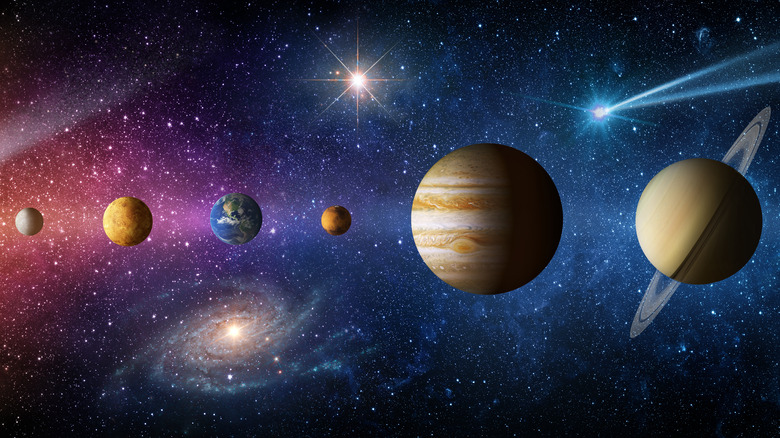A complete horoscope includes ten celestial bodies (or planets). Like the sun signs, each planet has its domain of influence and symbology.
To understand your birth chart, you need to know how to express and modify the nature of each planet through each of the signs present on it. Learn about the role of planets in Astrology and how they influence the energy of your astrological personality.
Planets in Astrology

When we want to understand the influences of the stars on the personality of our sun sign, we have to know which is our ruling planet.
Astrology considers ten planets: Sun, Moon, Mercury, Venus, Mars, Jupiter, Saturn, Uranus, Neptune, and Pluto. Each planet occupies a particular sign of the Zodiac, transmitting particular strengths and weaknesses. Some astrologers also consider the celestial object Chiron in their readings.
So while our sun sign may symbolize our essential self, we are a combination of signs, with influences from multiple planets simultaneously.
Ruling and Coregent Planets
Planets are the active principle of Astrology. As planetary positions vary from day to day, the planets make each birth chart unique. The positions they occupy on the chart are defined from the perspective of the Earth, the place from which they are observed.
1. Inner Planets = Personal Planets
The Greek civilization only knew the five inner planets visible to the naked eye: Mercury, Venus, Mars, Jupiter, Saturn. These, along with the Sun and the Moon, were called "vagabonds" (in Greek,
planets ).
These are considered personal planets: they are close to consciousness and represent aspects such as "love" or "desire."
Each of the seven planets is associated with a particular sign (s). The Sun and the Moon rule one sign each, Leo and Cancer, respectively. On the other hand, the other five planets regulated two signs each, one male and one female.
2. Outer Planets = Non-Personal Planets
Later, another three were added to the traditional planets, discovered thanks to technological evolution. Being much further from Earth, the outer planets are not visible to the naked eye: Uranus, Neptune, and Pluto. They are also called "modern planets" or trans-Saturnian planets.
In Astrology, these celestial bodies are considered non-personal, "external," or "transpersonal" planets since they co-regent a particular sign, not substituting its traditional ruler. They indicate energies such as transformation, evolution, and regeneration.
Recently (1977), something was discovered that was half comet, half asteroid, Chiron.
- Aries - Mars
- Taurus - Venus
- Gemini - Mercury
- Cancer - Moon
- Leo - Sun
- Virgo - Mercury
- Libra - Venus
- Scorpio - Pluto ( ruling planet in Modern Astrology), Mars (co-ruling planet)
- Sagittarius - Jupiter
- Capricorn - Saturn
- Aquarius - Uranus ( ruling planet in Modern Astrology), Saturn (co-regent planet)
- Pisces - Neptune ( ruling planet in Modern Astrology), Jupiter (co-ruling planet)
How do the planets affect the personality of the signs?
Traditionally, the planets' energies were seen as character traits or as forces that gave rise to specific events. In more recent times, planets have come to be seen in Astrology as archetypes or impulses based on people's behavior, and planets in transit (moving through space day after day) as activators.
For Astrology, the planets do not cause events, representing an inclination. For example, Mars in transit seems to push us towards impulsive behaviors or conflicts, and Neptune extends a veil of illusion that can hide the true nature of events and things.
1. Planets in Exile, Exaltation, or Fall
The planets can exert different levels of influence on the personality of the sun sign according to the position they occupy in it.
The planets can be "at home" when there is a sympathy between the planet and its sign or "in exile" or "weakened" when it is in the opposite sign to the ruling planet of the sun sign. There is little or no sympathy between the planet and the sign, resulting in some conflict, creating a symbolic disagreement.
It is said, then, that the planets can be in "exile," "exaltation," or "fall":
- Exile - when the planet is positioned opposite to the ruling planet of the sun sign.
- Exaltation is when the planet is positioned in the sign that exerts its most potent and characteristic influence.
- Fall is when the planet is positioned opposite the sign where it exerts its most significant influence.
2. Planet Well-Positioned or Bad Positioned
In Astrology, the planet can also be "well-positioned" or "badly positioned":
- Well-positioned - to say that a planet is "well-positioned" means that it is in a vital sign or house, or a positive aspect relative to other planets, or a combination of these factors
- When a planet is "misplaced" - or "in trouble" - it is either in a weak sign or house or a negative aspect relative to other planets or has a combination of these factors.
The symbolism of the Planets in Astrology

Each planet has its domain and symbolism. Modern Astrology also considers the newly discovered planet Chiron in its astrological chart. In Astrology, all the signs are Male or Female. To know in detail the symbolism of the planets in Astrology, select the planet to consult below:
- The Sun - Identity, Individuality, the Father
- The Moon - Instincts, subconscious, mother
- Mercury - Mindset, Communication
- Venus - Love, Values, Women
- Mars - Action, Man, Wish
- Jupiter - Wisdom, Expansion
- Saturn - Challenge, Moderation
- Uranus - Originality, Revolution
- Neptune - Spirituality, Illusion
- Pluto - Transformation, Underworld
- Chiron - Integration, Healing
- North Node - Destination, Future Potential
- South Node - Deep Experience, Lessons Learned
 When we want to understand the influences of the stars on the personality of our sun sign, we have to know which is our ruling planet.
Astrology considers ten planets: Sun, Moon, Mercury, Venus, Mars, Jupiter, Saturn, Uranus, Neptune, and Pluto. Each planet occupies a particular sign of the Zodiac, transmitting particular strengths and weaknesses. Some astrologers also consider the celestial object Chiron in their readings.
So while our sun sign may symbolize our essential self, we are a combination of signs, with influences from multiple planets simultaneously.
When we want to understand the influences of the stars on the personality of our sun sign, we have to know which is our ruling planet.
Astrology considers ten planets: Sun, Moon, Mercury, Venus, Mars, Jupiter, Saturn, Uranus, Neptune, and Pluto. Each planet occupies a particular sign of the Zodiac, transmitting particular strengths and weaknesses. Some astrologers also consider the celestial object Chiron in their readings.
So while our sun sign may symbolize our essential self, we are a combination of signs, with influences from multiple planets simultaneously.
 Each planet has its domain and symbolism. Modern Astrology also considers the newly discovered planet Chiron in its astrological chart. In Astrology, all the signs are Male or Female. To know in detail the symbolism of the planets in Astrology, select the planet to consult below:
Each planet has its domain and symbolism. Modern Astrology also considers the newly discovered planet Chiron in its astrological chart. In Astrology, all the signs are Male or Female. To know in detail the symbolism of the planets in Astrology, select the planet to consult below: